Seven effective natural preservatives can protect your alcohol-free perfumes: grapefruit seed extract, vitamin E oil, rosemary essential oil, neem oil, Leucidal liquid (fermented radish root), tea tree oil, and Japanese honeysuckle extract. You'll find these alternatives are safer than synthetic preservatives while offering powerful antimicrobial and antioxidant properties. Each option brings unique benefits for both fragrance preservation and skin health, making them ideal choices for your natural perfumery journey.
Grapefruit Seed Extract: Nature's Antimicrobial Shield
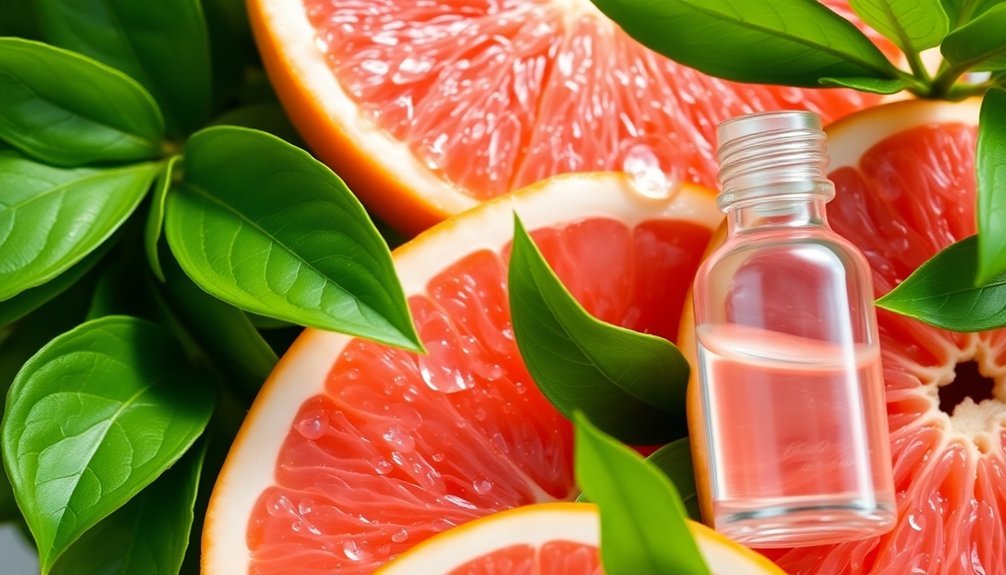
A powerhouse of natural antimicrobial defense, grapefruit seed extract stands out as one of nature's most potent preservatives.
You'll find it's 10 to 100 times more effective than other antimicrobial substances, targeting over 800 bacterial and viral strains while remaining gentle on beneficial bacteria.
If you're formulating alcohol-free perfumes, you'll need to be mindful of concentration levels.
While it's toxic at higher concentrations, it's perfectly safe at a 1:512 dilution and shouldn't exceed 0.1% to prevent skin irritation.
Keep in mind that you can't use it with anionic ingredients, and you'll need to pair it with a full-spectrum preservative in water-based formulations. The chemical alteration process significantly impacts its antimicrobial effectiveness compared to fresh grapefruit extract.
Rich in phytochemicals, including flavonoids and vitamins C and E, it disrupts harmful bacterial membranes within just 15 minutes of contact.
Vitamin E Oil: The Antioxidant Powerhouse
When you're looking for a natural perfume preservative, vitamin E oil stands out as a powerhouse antioxidant that neutralizes harmful free radicals and extends your fragrance's shelf life.
You'll find this versatile oil actively fights oxidation while providing skin-nourishing benefits to your natural perfume formulations. Natural sources like plant-based oils and nuts provide abundant vitamin E content that can be extracted for preservation purposes.
Your perfumes will benefit from vitamin E's ability to maintain fragrance integrity while simultaneously offering protective antioxidant properties that support skin health.
Potent Free-Radical Fighter
Vitamin E oil stands as nature's premier antioxidant powerhouse in natural perfumery. You'll find this powerful ingredient actively fighting free radicals that can damage your skin cells while preserving your favorite alcohol-free fragrances.
It works by stopping reactive oxygen species (ROS) from forming when fats oxidize, effectively protecting both the perfume's integrity and your skin's health. The formulation provides a gentle alternative option for those with sensitive skin concerns.
When you choose perfumes containing vitamin E oil, you're getting more than just a natural preservative. It's enhancing your skin's moisture barrier while preventing the oxidation that can alter a fragrance's intended scent.
This dual-action defender not only maintains your perfume's original aroma but also supports your skin's natural functions through cell signaling and metabolic processes, making it an essential component in modern natural perfumery.
Natural Shelf-Life Extension
Through its powerful antioxidant properties, vitamin E oil dramatically extends the shelf life of natural perfumes by neutralizing harmful free radicals.
When you add vitamin E to your perfume formulations, you'll protect sensitive ingredients from oxidation and degradation, ensuring your fragrances stay fresh and vibrant for months.
- Natural preservation: Combines effectively with essential oils and carrier oils like jojoba and almond, making it ideal for alcohol-free perfumes
- Eco-friendly choice: Biodegradable and cruelty-free alternative to synthetic preservatives
- Versatile compatibility: Works harmoniously with other natural ingredients without affecting scent profiles
- Clean formulation: Eliminates the need for harsh chemicals like phthalates and parabens while maintaining product stability
You'll appreciate how vitamin E supports both product longevity and environmental sustainability while keeping your perfumes free from toxic preservatives.
Skin-Nourishing Preservation Benefits
Beyond its preservative power, vitamin E oil offers remarkable skin-nourishing benefits that make it an ideal ingredient for natural perfumes. As a potent antioxidant, it protects your skin from free radicals, pollution, and UV radiation while neutralizing harmful reactive oxygen species.
You'll find it especially effective at moisturizing and soothing dry, flaking skin. While applying your natural perfume, you're also treating your skin to vitamin E's moisturizing properties, which can help manage conditions like eczema and psoriasis.
It may even help reduce the appearance of wrinkles and age-related skin damage, though scientific evidence is still limited. The oil also nourishes the skin around your nails, preventing cracked cuticles and maintaining healthy nail beds – an added benefit when you apply perfume to your pulse points.
Rosemary Essential Oil: Traditional Preservation Method
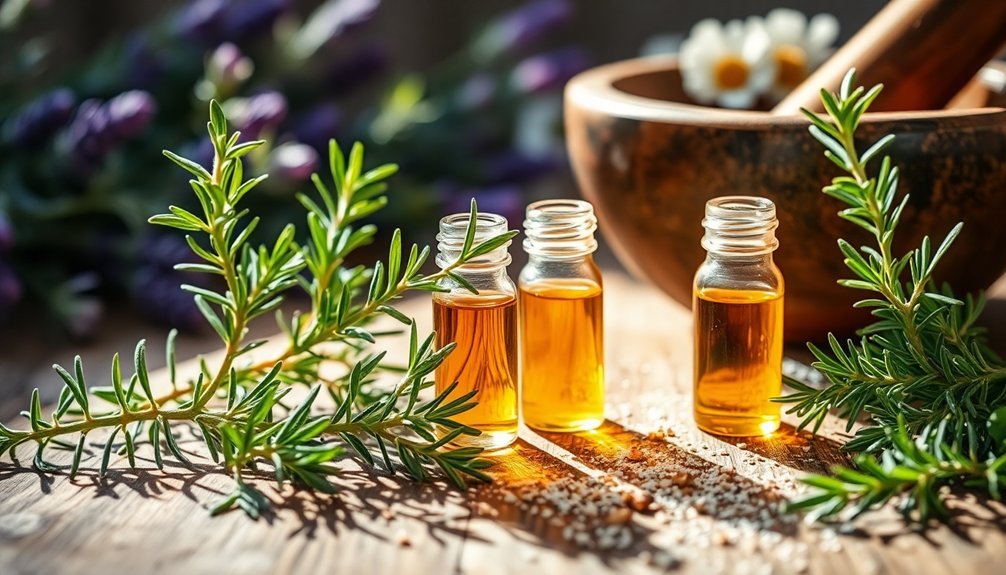
While rosemary essential oil has historically been associated with preservation, it's crucial to understand its true capabilities and limitations.
Though it's an effective antioxidant that prevents fats from becoming rancid, it won't protect your perfume against bacterial or yeast growth. You'll need to be especially cautious when using it in water-based formulations, as it doesn't provide the necessary antimicrobial protection.
- Use only in oil-based perfumes where bacterial growth isn't a primary concern
- Store your rosemary-containing products in amber glass bottles to protect from UV damage
- Don't rely on it as your sole preservative, especially in water-based formulations
- Consider combining it with proven preservation methods for ideal results
Remember to conduct patch tests and avoid use if you're pregnant, nursing, or have specific health conditions.
Neem Oil: Ancient Preservative Wisdom
You'll find neem oil's powerful antimicrobial properties make it an excellent natural preservative for alcohol-free perfumes.
Its rich composition of fatty acids and antibacterial compounds helps protect your fragrance blends from harmful microorganisms that could spoil them.
Ancient skincare traditions have long relied on neem oil's preservation qualities, demonstrating its effectiveness through centuries of practical application in beauty and wellness formulations.
Natural Antimicrobial Properties
Since ancient times, neem oil has proven itself as one of nature's most potent antimicrobial preservatives.
You'll find its remarkable broad-spectrum activity particularly effective against common bacteria that could compromise your natural perfumes. The secret lies in its powerful bioactive compounds like nimbidin, azadirachtin, and gedunine, which work together to create a robust preservation system.
- Ethanolic and methanolic extracts show the highest antibacterial efficacy, with significantly low minimum inhibitory concentrations.
- Active compounds like nimbidin and azadirachtin target multiple bacterial strains simultaneously.
- Cyclic sulphides provide additional antifungal protection for your formulations.
- Natural polysaccharides offer anti-inflammatory benefits while preserving your fragrance.
When you're formulating alcohol-free perfumes, neem oil's extensive antimicrobial properties make it an ideal natural preservative choice, backed by both traditional wisdom and modern scientific validation.
Traditional Skincare Applications
Throughout history, neem oil's remarkable skincare benefits have made it a cornerstone of traditional medicine and beauty rituals. You'll find its healing properties are particularly effective for common skin concerns, from acne to aging.
| Skin Concern | Application Method | Expected Benefits |
|---|---|---|
| Acne & Spots | Spot Treatment | Reduces inflammation, kills bacteria |
| Dry Skin | Mix with moisturizer | Deep hydration, barrier repair |
| Aging Signs | Daily facial oil | Boosts collagen, fights free radicals |
| Scars & Marks | Direct application | Enhances cell turnover, fades spots |
| Skin Infections | Diluted treatment | Antimicrobial protection, healing |
You can easily incorporate neem oil into your skincare routine by adding a few drops to your favorite products or using it as a targeted treatment. Its versatility makes it effective for both daily maintenance and addressing specific skin concerns.
Leucidal Liquid: Fermented Radish Root Protection
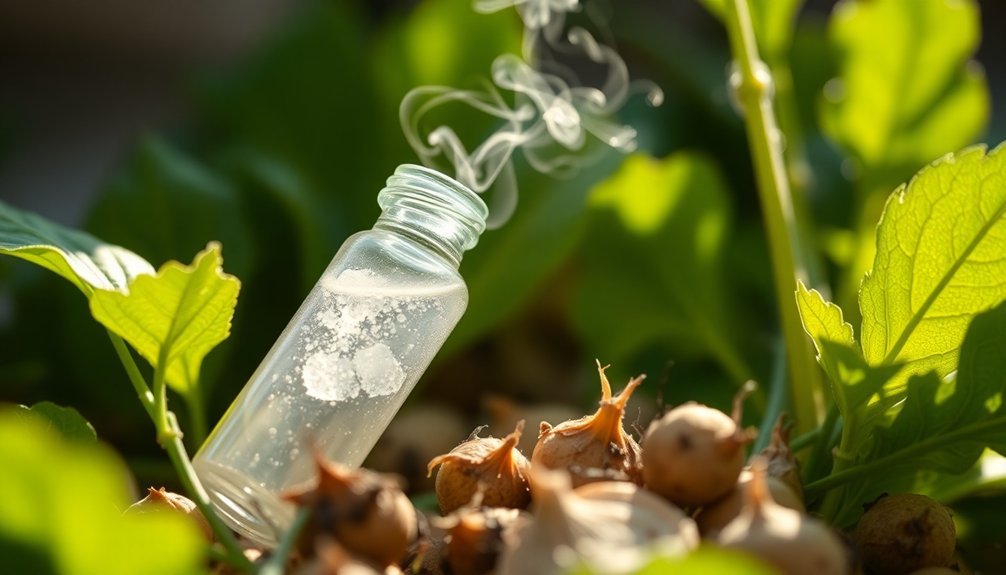
While many natural preservatives struggle to match synthetic alternatives, Leucidal Liquid stands out as a powerful antimicrobial derived from radishes fermented with Leuconostoc kimchii bacteria.
This ECOCert-approved preservative protects your formulations through a broad-spectrum approach that's effective against both bacteria and fungi.
- You'll find it's water-soluble and heat stable up to 60°C, making it perfect for alcohol-free perfumes.
- It works effectively at a 1-4% concentration range across pH levels 3-8.
- You won't need to worry about strong odors affecting your fragrance as it's virtually odorless.
- Your formulations stay protected for up to 12 months, with proven effectiveness against both Gram-positive and Gram-negative bacteria.
Add it during the cool-down phase of your formulation for ideal preservation of your natural perfumes.
Tea Tree Oil: Natural Antimicrobial Agent
A powerful alternative to synthetic preservatives, tea tree oil serves as a versatile antimicrobial agent in alcohol-free perfumes. You'll find its effectiveness comes from terpinen-4-ol and α-pinene, which work together to disrupt microbial membranes and inhibit cellular respiration.
When you're formulating natural perfumes, tea tree oil offers superior protection against both Gram-positive and Gram-negative bacteria. It's particularly effective at eliminating common threats like E. coli and MRSA within 60 minutes of contact.
You can safely incorporate this sustainable ingredient, as it's been proven gentler on skin than traditional preservatives, especially when using Clone 88 variants.
What's more, you're choosing an environmentally responsible option. Tea tree oil is biodegradable and derived through steam distillation, yielding about 1.8% from Melaleuca alternifolia leaves and twigs.
Japanese Honeysuckle Extract: Botanical Preservation System
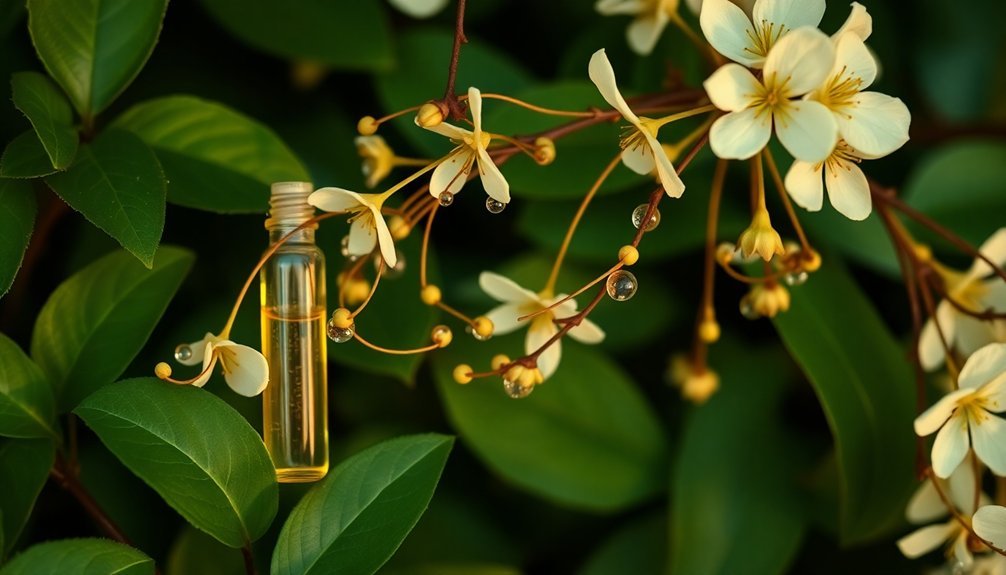
Since gaining prominence in natural skincare, Japanese Honeysuckle extract has emerged as a powerful botanical preservative system for alcohol-free perfumes. You'll find this extract effectively inhibits bacteria, yeast, and mold growth at concentrations between 0.5-2%, making it an excellent natural alternative to synthetic preservatives.
- Works synergistically with other plant-based ingredients while maintaining product stability in formulations with pH 5-8.
- Contains potent antioxidants like vitamins C and E that protect your perfume from oxidation and degradation.
- Offers a light, invigorating natural scent that won't interfere with your perfume's fragrance profile.
- Provides antimicrobial protection without the need for artificial parabens or alcohol.
When sourcing honeysuckle extract, verify you're working with reliable suppliers to avoid potential contamination issues with formaldehyde or other unwanted chemicals.
Frequently Asked Questions
Can Alcohol-Free Perfumes Trigger Allergies in People With Plant Sensitivities?
Yes, you can experience allergic reactions to alcohol-free perfumes if you're sensitive to plant ingredients. Natural components like essential oils, lavender, and chamomile can trigger symptoms including rashes, itching, and respiratory issues.
How Do Natural Preservatives Affect the Original Scent of the Perfume?
Natural preservatives can subtly alter your perfume's original scent since they have their own aromas. You'll notice that essential oils and plant extracts might add slight herbal or floral notes to the fragrance blend.
What's the Average Shelf Life of Perfumes Using Only Natural Preservatives?
When you're using natural preservatives, expect your perfumes to last 1-3 years if stored properly. You'll get the best results by keeping them in cool, dark places and using airtight, UV-protective containers.
Do Natural Preservatives Work Effectively in Both Oil-Based and Water-Based Perfumes?
No, they don't work equally in both. You'll find that oil-based perfumes rarely need preservatives, while water-based ones require specific water-soluble natural preservatives to effectively prevent microbial growth and contamination.
Which Natural Preservatives Are Best for Preventing Mold Growth Specifically?
For preventing mold growth, you'll find grapefruit seed extract and Leucidal Liquid SF are your best options. They're highly effective when combined, and you can boost their power with salt or vinegar additions.
In Summary
Natural perfume preservation doesn't have to rely on synthetic chemicals or alcohol. You'll find these seven botanically-derived preservatives offer effective protection while maintaining your fragrance's integrity. Whether you're choosing grapefruit seed extract for its potent antimicrobial properties or vitamin E oil for antioxidant benefits, you're making a conscious choice for cleaner, safer scents. Try incorporating these natural alternatives into your next perfume creation.
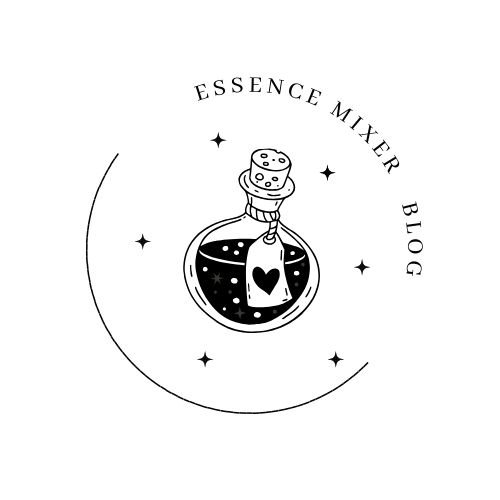
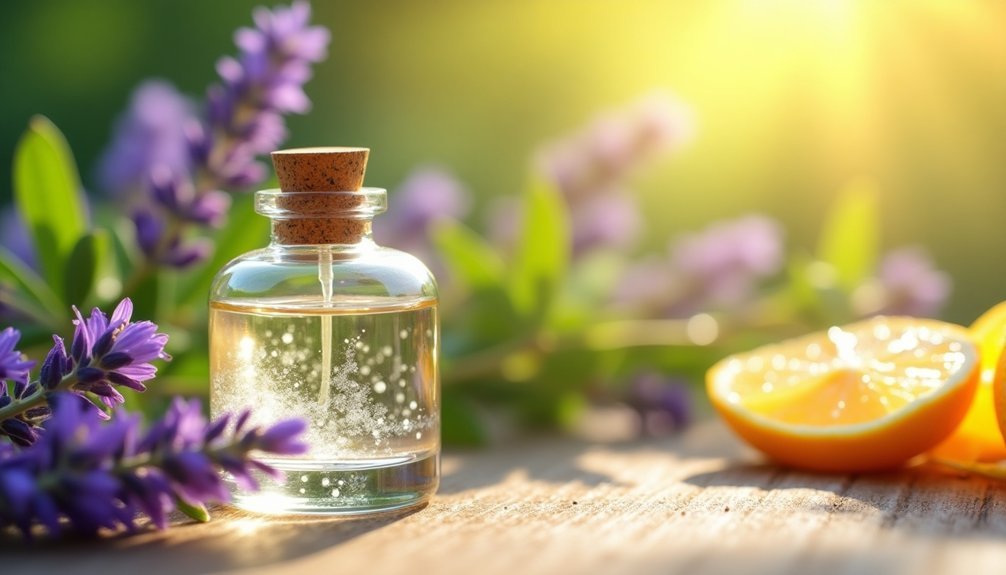


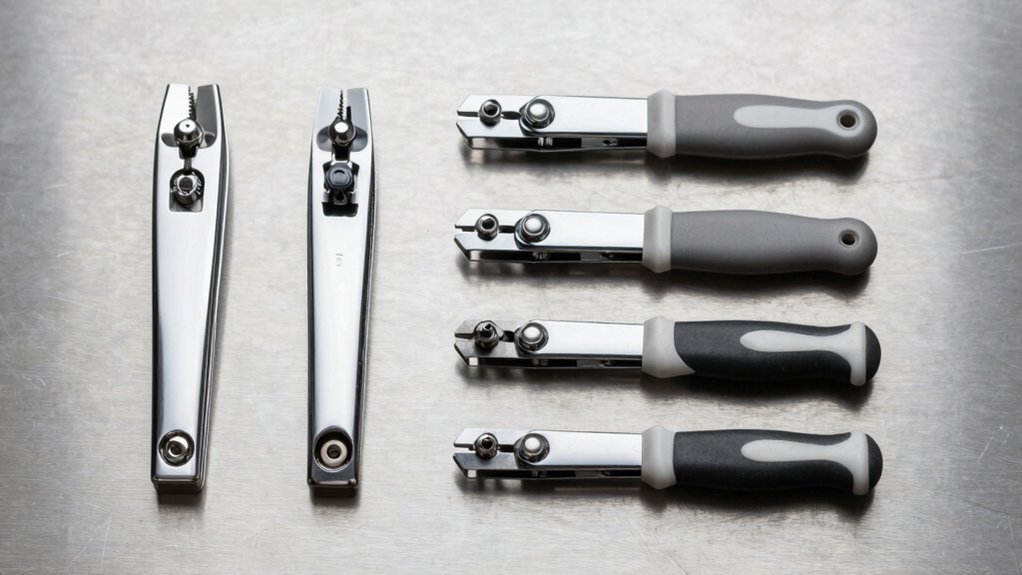
Leave a Reply